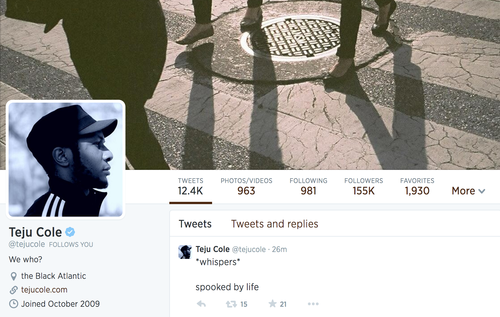
Welcome to the third installment of What Would Twitter Do? in which ten of my favorite people on Twitter talk about what they do on Twitter and why—their Twitter philosophies, their do’s and don’ts, and what they make of the medium in general. Today I speak with Teju Cole (@tejucole), author of the books Open City and Every Day is for the Thief. He is one of the most consistently interesting literary figures on Twitter—his tweets are often political (ex: Q: How many Nigerians does it take to change a lightbulb? A: The use of lightbulbs is the opposition’s attempt to embarrass Pres Jonathan) (ex 2: Always thinking about this: abolitionism and women’s suffrage were acts of imagination in a world that considered those goals unimaginable.); he tweets incredible photos from his travels (most recently in Jerusalem); one of his signatures is a short “newsy” narrative reminiscent of the stories in Thomas Bernhard’s The Voice Imitator.
The first time I met him was at a Book Expo event in 2011, where he was doing a talk on how to use social media—Twitter in particular— at a time when publishers were still trying to understand how the medium might work for authors.
The following interview was conducted using Twitter direct messaging, of course.
– Sheila Heti
SHEILA HETI: I wonder if you have any general thoughts about what makes good tweets, or bad tweets, or what you would consider a bad twitter attitude or a good twitter strategy—not only in terms of what you do, but in terms of what you read.
TEJU COLE: In line at the passport office. Madness. [a few minutes later] Lemme send a few thoughts. Twitter is an interesting (and I think genuinely new) form of communication that also happens to be a corporation. This tension is interesting because you’re trying to “do language” in a way that satisfies your priorities (ambitious or not) and that has some overlap with Twitter’s interest in building a profitable company that is also considered “cool.” So you’re using them and they’re using you. I’m interested in the people who best negotiate this tension. Lots of examples of “creative” users, of course, and “artistic” users. But I’m especially interested at the moment in the people who (unlike me) are not “creative” on Twitter in terms of using it for projects. These are people who are simply doing language in a (seemingly) unpremeditated or at least unsystematic way, but who have such quality of mind (and access to words) that there is a real pleasure in reading their tweets.
Is Twitter a...
You have reached your article limit
Sign up for a digital subscription and continue reading all new issues, plus our entire archives, for just $1.50/month.
Already a subscriber? Sign in




